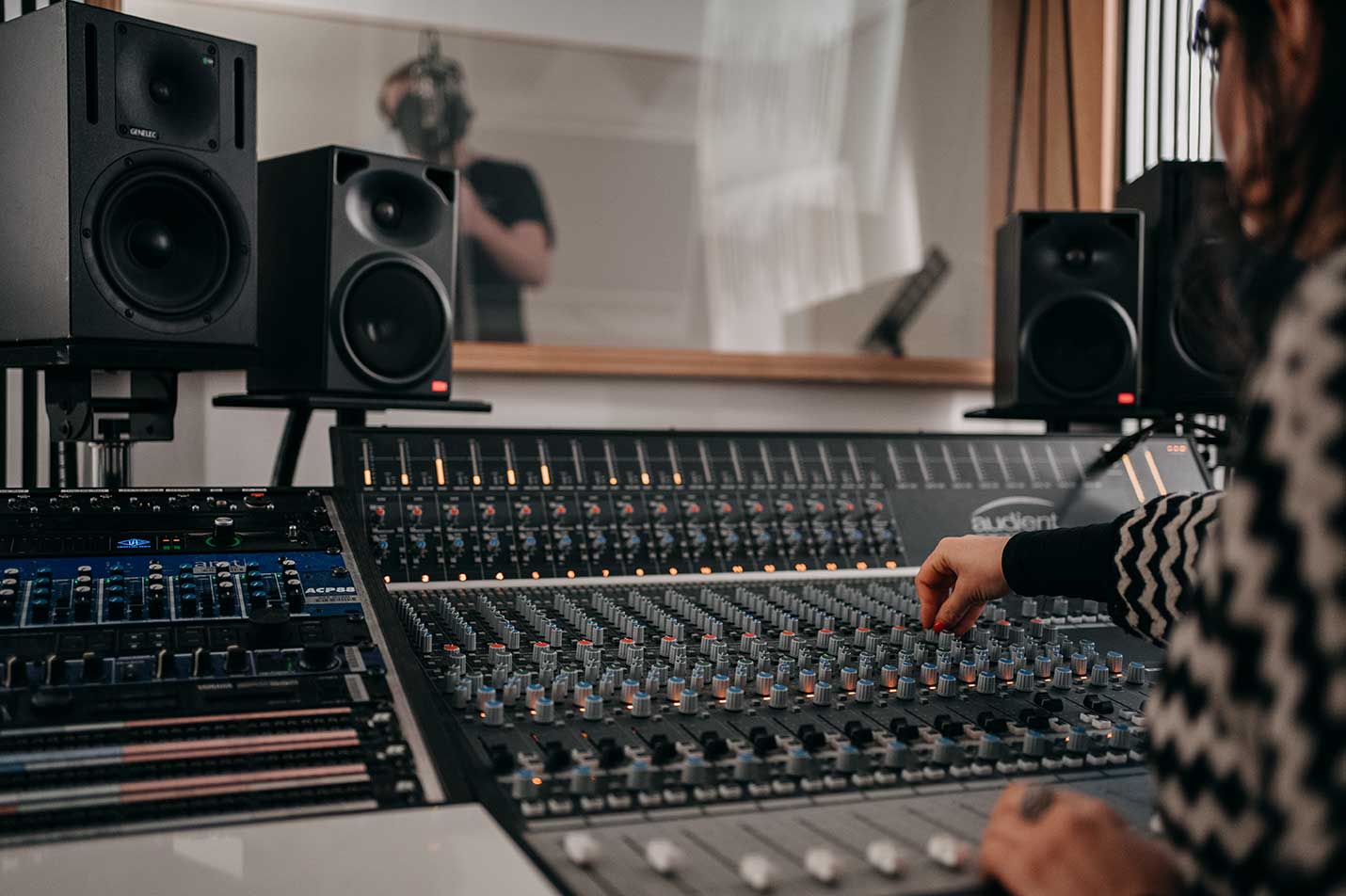Home>Devices & Equipment>Radio>How To Become A Radio Host


Radio
How To Become A Radio Host
Modified: January 22, 2024
Learn how to become a radio host and pursue your passion for the radio industry. Gain insights, tips, and techniques to start your journey in radio.
(Many of the links in this article redirect to a specific reviewed product. Your purchase of these products through affiliate links helps to generate commission for AudioLover.com, at no extra cost. Learn more)
Table of Contents
- Introduction
- Step 1: Developing your radio voice
- Step 2: Gaining knowledge about radio broadcasting
- Step 3: Building your experience and portfolio
- Step 4: Networking and making connections in the industry
- Step 5: Applying for radio host positions
- Step 6: Preparing for radio host auditions
- Step 7: Nailing the radio host interview
- Step 8: Continuing to refine your skills as a radio host
- Conclusion
Introduction
Welcome to the exciting world of radio hosting! Being a radio host is not only a fulfilling career but also a fantastic way to connect with listeners and share your passion for music, news, or entertainment. Whether you dream of hosting your own talk show, spinning the latest hits on a popular radio station, or offering insightful commentary on current events, this guide will provide you with the steps to help you become a successful radio host.
Radio broadcasting has evolved over the years, adapting to new technologies and platforms, but it remains a powerful medium that reaches millions of people worldwide. As a radio host, you have the opportunity to engage with your audience, entertain, inform, and inspire through your voice and personality.
In this comprehensive guide, we will explore the key steps to becoming a radio host. We will discuss how to develop your radio voice, gain knowledge about radio broadcasting, build experience and a portfolio, network within the industry, apply for host positions, prepare for auditions, excel in interviews, and continuously refine your skills as a host.
While the road to becoming a radio host may require dedication, perseverance, and hard work, it is a journey that many before you have embarked upon and succeeded in. So, if you’re ready to take the first step towards your dream career in radio hosting, let’s jump right in!
Step 1: Developing your radio voice
One of the most important aspects of being a radio host is having a captivating and distinctive voice. Your voice is your primary tool to engage and connect with your audience. While some individuals may naturally have a great radio voice, most will need to work on developing and refining their vocal skills. Here are some tips to help you develop your radio voice:
- Practice vocal exercises: Just like any other skill, practicing specific exercises can help improve your vocal range, clarity, and diction. Work on exercises that focus on breathing techniques, pitch control, and enunciation. There are various online resources and vocal coaches who can guide you through these exercises.
- Listen to professional radio hosts: Take the time to listen to experienced radio hosts and pay attention to their delivery, tone, pacing, and phrasing. Listen to different genres and styles of radio shows to get a sense of the variety in voices. This will help you develop your own unique style while learning from the pros.
- Record and analyze your voice: Record yourself speaking or practicing specific segments and listen back to it. Pay attention to areas where you can improve, such as clarity, volume, or energy level. Take note of any nervous habits or speech patterns that you can work on eliminating.
- Seek feedback: Ask trusted friends, family members, or mentors to provide constructive feedback on your speaking voice. They can help identify areas for improvement and offer suggestions to enhance your delivery.
- Work on pronunciation: Clear pronunciation is vital in radio broadcasting. Practice pronouncing difficult words and names to ensure you can articulate them accurately and confidently during live broadcasts.
- Warm up before each broadcast: Before going live on air, warm up your voice by doing vocal exercises, humming, or simply speaking aloud. This will help avoid vocal strain and ensure your voice sounds its best throughout the broadcast.
Remember, developing your radio voice is an ongoing process. Continuously practice, seek feedback, and listen to professional hosts to refine and enhance your skills. Developing a strong and captivating voice is a crucial step towards becoming an excellent radio host.
Step 2: Gaining knowledge about radio broadcasting
As a radio host, it’s essential to have a solid understanding of the fundamentals of radio broadcasting. This knowledge will not only make you more effective in your role but also help you navigate the industry with confidence. Here are some steps to gain knowledge about radio broadcasting:
- Study radio broadcasting principles: Take the time to learn about the different aspects of radio broadcasting, including the structure of a radio station, programming formats, audience demographics, and industry trends. Familiarize yourself with the technical equipment used in radio studios and the software for managing playlists and audio editing.
- Enroll in radio broadcasting courses: Consider enrolling in formal radio broadcasting courses or workshops offered by educational institutions or online platforms. These courses will provide you with comprehensive knowledge about radio production, interviewing techniques, scriptwriting, and broadcasting ethics.
- Listen to a variety of radio shows: Tune in to different radio stations and listen to a wide range of shows across various genres. Pay attention to how hosts structure their shows, interact with guests, and engage with their audience. Take note of what works and what doesn’t work in terms of content delivery and communication style.
- Shadow experienced radio hosts: Reach out to local radio stations or hosts and inquire about the possibility of shadowing them during their broadcasts. This hands-on experience will give you valuable insights into the day-to-day workings of a radio station and the responsibilities of a host.
- Intern at a radio station: Consider applying for internships at local radio stations. Internships are a great way to gain practical experience and exposure to the inner workings of a radio station. You’ll have the opportunity to assist with production tasks, observe live broadcasts, and learn from experienced professionals.
- Stay updated with industry news and trends: Follow industry publications, blogs, and podcasts that cover radio broadcasting news and trends. This will keep you informed about new technologies, industry developments, and best practices in radio hosting.
Gaining knowledge about radio broadcasting is a continuous process. The more you immerse yourself in the world of radio, the more insights and skills you will acquire. By developing a solid understanding of the industry, you’ll be better equipped to excel as a radio host and create engaging content that resonates with your audience.
Step 3: Building your experience and portfolio
Building experience and creating a strong portfolio is crucial in the competitive field of radio hosting. Employers and radio stations often look for hosts who have a proven track record and a diverse range of skills. Here are some steps to help you build your experience and portfolio:
- Start with community or campus radio: Volunteer or seek opportunities at local community or campus radio stations. These platforms offer valuable hands-on experience and allow you to practice your hosting skills. You can work on developing your own show or assist existing hosts, gaining exposure to different aspects of radio production.
- Create your own podcast or online show: Launching your own podcast or online show is another effective way to gain experience and showcase your hosting abilities. Choose a topic that interests you and start creating content. This will not only help you refine your hosting skills but also demonstrate your creativity and ability to connect with an audience.
- Participate in radio contests or competitions: Look for radio contests or competitions in your area. Participating in these events provides an excellent opportunity to test your skills, gain exposure, and potentially win awards or recognition. These achievements can add credibility to your portfolio.
- Guest appearances on other shows: Reach out to established radio hosts and offer to make guest appearances on their shows. This allows you to expand your network, reach new audiences, and demonstrate your versatility as a host. It also gives you the chance to learn from experienced hosts and gain exposure in the industry.
- Attend industry events and conferences: Look for industry events, conferences, or workshops related to radio broadcasting. These gatherings are an excellent opportunity to network with professionals, learn from industry experts, and stay updated with the latest trends and technologies in radio hosting.
- Seek feedback and testimonials: Ask for feedback from listeners, mentors, or professionals in the field. Their insights and testimonials can be added to your portfolio, showcasing your growth as a host and the impact you’ve made on your audience.
Remember, building experience and a strong portfolio takes time and dedication. Focus on creating quality content, seeking opportunities to showcase your skills, and continuously improving your hosting abilities. A diverse and impressive portfolio will increase your chances of securing opportunities as a radio host and open doors to bigger platforms.
Step 4: Networking and making connections in the industry
In the competitive world of radio hosting, networking and making connections in the industry can play a significant role in opening doors to opportunities. Building relationships with professionals in the field can lead to job offers, collaborations, and valuable mentorship. Here are some steps to help you network and make connections in the radio industry:
- Attend industry events: Look for radio industry events, conferences, and trade shows in your area. These gatherings provide opportunities to meet and connect with professionals in the field, including radio station owners, producers, and other hosts. Be sure to introduce yourself, exchange contact information, and follow up with a personalized message after the event.
- Join industry organizations: Become a member of industry organizations such as the National Association of Broadcasters (NAB) or the International Association of Broadcasters (IAB). These organizations often host networking events, workshops, and seminars, providing a platform to meet and connect with industry leaders.
- Utilize online platforms: Make use of social media platforms like LinkedIn, Twitter, and Facebook to connect with professionals in the radio industry. Join relevant groups, participate in discussions, and share your work. Engage with others in the field and build relationships through online networking.
- Reach out to professionals: Don’t be afraid to reach out directly to professionals in the industry whose work you admire or who have experience and wisdom to offer. Send personalized and concise messages expressing your interest in their work and request a conversation or advice. Building genuine connections can lead to valuable mentorship opportunities or potential collaborations.
- Attend radio station open houses: Many radio stations organize open houses or special events to engage with their audience. Take advantage of these opportunities to visit the stations, meet the staff, and potentially connect with hosts or producers who may be looking for new talents.
- Stay in touch: Once you make connections in the industry, it’s important to nurture those relationships. Send occasional emails, attend industry events together, or offer to collaborate on projects. Regularly reaching out and staying connected can help you maintain and strengthen your network.
Remember, networking is a two-way street. Be supportive of others in the industry, offer assistance or advice when possible, and be genuine in your interactions. Building a strong network takes time and effort, but the connections you make can be invaluable in advancing your career as a radio host.
Step 5: Applying for radio host positions
Once you have gained some experience and developed your skills as a radio host, it’s time to start applying for radio host positions. This step is crucial in securing opportunities to showcase your talent and further grow in your career. Here are some steps to consider when applying for radio host positions:
- Research potential employers: Take the time to research radio stations and networks that align with your interests and career goals. Familiarize yourself with their programming format, target audience, and the type of hosts they typically hire. This will help you tailor your application to each specific station.
- Create a compelling resume and demo: Craft a well-structured resume that highlights your relevant experience, skills, and achievements. Be sure to include any hosting roles you’ve had, examples of successful shows or projects, and any relevant training or certifications. Additionally, create a demo reel that showcases your on-air presence, interviewing skills, and ability to engage listeners.
- Write a personalized cover letter: When applying for radio host positions, it’s important to write a personalized and compelling cover letter. Highlight your passion for radio, your unique qualities as a host, and your understanding of the station’s audience and programming. Demonstrate your enthusiasm and make a strong case for why you would be a valuable addition to their team.
- Network within the industry: Utilize the connections you have made through networking to learn about any potential job openings or recommendations for host positions. Industry professionals and other hosts may be aware of opportunities that are not publicly advertised.
- Utilize job boards and online platforms: Keep an eye on job boards, such as those provided by radio industry websites or job search engines. Be proactive in searching for host positions and set up email alerts to be notified of new job postings. Additionally, make use of online platforms like LinkedIn or radio industry forums, where employers may promote openings.
- Follow application instructions: Pay close attention to the application instructions provided by the radio station. They may have specific requirements for submitting your resume, demo, and cover letter. Make sure to follow these instructions carefully to demonstrate your attention to detail and professionalism.
- Prepare for interviews: If your application is successful, you may be invited for an interview. Prepare by researching the station, understanding their audience, and having examples of your past work ready to discuss. Practice answering common interview questions and be prepared to showcase your personality, knowledge, and passion for radio hosting.
Securing a radio host position may require patience and persistence. Keep applying to positions that align with your goals, continue to refine your skills, and take advantage of any opportunities that come your way. With perseverance and a strong application, you can land the radio hosting job you’ve been dreaming of.
Step 6: Preparing for radio host auditions
As you progress in your journey to become a radio host, you may be required to audition for host positions. Auditions are an important opportunity to showcase your skills, personality, and ability to engage with an audience. Here are some steps to help you prepare for radio host auditions:
- Familiarize yourself with the station: Research the station or network you’re auditioning for. Understand their target audience, programming format, and the type of content they typically broadcast. This will help you tailor your audition to fit their branding and appeal to their listeners.
- Practice your on-air presence: Set up a mock radio broadcast environment and practice hosting as if you were on air. Pay attention to your voice modulation, pacing, and energy level. Practice transitioning between different segments and maintaining a smooth and engaging flow throughout the audition.
- Prepare content: Create compelling and relevant content for your audition. This could include sample segments, interviews, or discussions. Choose topics that resonate with the station’s target audience and highlight your strengths as a host. Showcase your ability to inform, entertain, and engage listeners.
- Showcase your versatility: Demonstrate your versatility as a host by showcasing different styles, such as casual, conversational, or informative. This will highlight your ability to adapt to various formats and keep the audience engaged. Showcase your ability to ad-lib and think on your feet.
- Practice live broadcasts: Simulate a live broadcast scenario during your practice sessions. Challenge yourself to think and respond quickly to unplanned events or comments. This will not only demonstrate your ability to handle unexpected situations but also showcase your natural presence and ability to connect with listeners in real-time.
- Seek feedback: Record your audition or share it with trusted friends, mentors, or industry professionals for feedback. Ask for constructive criticism and suggestions for improvement. Consider their insights and use them to refine your audition.
- Be confident and authentic: During the audition, be yourself and let your personality shine. Show confidence in your abilities and let your passion for radio hosting come through. Engage with the content, demonstrate your knowledge, and connect with the imaginary audience as if they were real listeners.
- Pay attention to technical aspects: Familiarize yourself with the technical aspects of recording or live broadcasting. Understand the equipment you’ll be using and practice operating it smoothly. Pay attention to your voice levels, audio quality, and clarity during the audition.
- Prepare answers to potential questions: Anticipate potential questions the audition panel might ask and prepare thoughtful and concise responses. Potential questions may include your experience in hosting, your understanding of the station’s target audience, or how you handle challenging situations on air.
By preparing thoroughly and showcasing your skills, personality, and adaptability, you will increase your chances of making a lasting impression during radio host auditions. Remember to stay calm, be authentic, and let your love for radio hosting shine through.
Step 7: Nailing the radio host interview
After successfully passing the audition stage, the next step in becoming a radio host is the interview. The interview is an opportunity to showcase your personality, communication skills, and suitability for the radio host position. To ensure you make a positive and lasting impression, consider the following steps to nail the radio host interview:
- Research the station: Learn as much as you can about the station, including its history, programming format, target audience, and popular shows. Use this information to tailor your responses and demonstrate your knowledge and genuine interest in the station.
- Prepare talking points: Identify key talking points or stories that highlight your experience, skills, and passion for radio hosting. Have specific examples ready that illustrate your ability to connect with listeners, handle challenging situations, or create engaging content. Be prepared to share these stories when relevant during the interview.
- Demonstrate your familiarity with the audience: Show your understanding of the station’s target audience and how you would appeal to them. Discuss your ideas for content that would engage and resonate with their listeners. Emphasize your ability to adapt your hosting style to different demographics and keep the audience entertained and informed.
- Showcase your knowledge of current events: Radio hosts often discuss current events and trending topics. Stay updated on the latest news, entertainment, and pop culture to demonstrate your ability to offer insightful commentary and engage listeners in meaningful discussions.
- Highlight your teamwork and collaboration skills: Radio hosting often involves working closely with producers, co-hosts, and other team members. Showcase your ability to collaborate and be a team player. Highlight experiences where you have successfully worked in a team environment, problem-solved together, or supported fellow hosts or colleagues.
- Be polished and professional: Dress appropriately for the interview, showcasing your professionalism and respect for the opportunity. Arrive on time, bring extra copies of your resume and any relevant materials, and maintain good eye contact and positive body language throughout the interview.
- Ask thoughtful questions: Prepare a list of thoughtful questions to ask the interviewer. This demonstrates your interest, critical thinking, and desire to learn more about the position and the station. It also gives you a deeper understanding of what they are looking for, allowing you to tailor your responses accordingly.
- Be authentic and personable: Show your genuine personality and let your passion for radio hosting shine through during the interview. Be confident in sharing your unique qualities, experiences, and what sets you apart from other candidates. Engage in genuine conversation and connect with the interviewer on a personal level.
Remember, the interview is an opportunity to showcase your skills and personality while demonstrating why you are the perfect fit for the radio host position. By thoroughly researching the station, preparing talking points, and showcasing your knowledge and professionalism, you can make a strong impression during the interview and increase your chances of securing the position.
Step 8: Continuing to refine your skills as a radio host
Becoming a radio host is an ongoing journey of growth and improvement. Even after securing a position, it’s important to continue refining your skills to stay relevant and excel in your career. Here are some steps to help you continue refining your skills as a radio host:
- Seek feedback: Actively seek feedback from colleagues, mentors, and listeners. Ask for constructive criticism to identify areas for improvement. Take their insights to heart and use them to enhance your hosting abilities.
- Listen to feedback: Be open and receptive to feedback. It can be difficult to receive criticism, but it’s essential for personal and professional growth. Listen attentively, reflect on the feedback, and make necessary adjustments to improve your performance.
- Engage in self-reflection: Allocate time for self-reflection and self-evaluation. Listen to recordings of your shows, analyze your delivery, timing, and content. Identify areas for improvement and set goals to work on those specific aspects.
- Stay informed and curious: Continuously expand your knowledge base and stay updated with the latest industry trends, news, and technologies. Attend workshops, conferences, and webinars to enhance your skills and broaden your perspective as a radio host.
- Take additional training: Consider enrolling in advanced radio broadcasting courses, voice training programs, or workshops that focus on specific areas such as interviewing techniques, storytelling, or content creation. Ongoing training helps you develop new skills and stay ahead in the ever-evolving radio industry.
- Experiment with new formats and content: Challenge yourself by trying different formats, styles, and content types. Experiment with interviews, segments, or themed shows. This will keep your creativity flowing and offer listeners a fresh and engaging experience.
- Collaborate with others: Collaborate with other hosts, artists, or industry professionals. This allows you to learn from different perspectives, gain new insights, and create unique content. Partnering with others also expands your network and exposes you to a wider audience.
- Adapt to new technologies: Embrace emerging technologies and platforms in radio broadcasting. Stay informed about advancements in podcasting, live streaming, and social media integration. Keep exploring new ways to connect and engage with your audience using these tools.
- Practice time management: Develop strong time management skills to effectively plan and produce your shows. Punctuality, organizing your content, and adhering to schedules ensure smooth on-air delivery and consistent quality for your listeners.
- Stay passionate: Maintain your passion for radio hosting. Remember why you started and the impact you can make through your voice. Channel your enthusiasm into your shows and let your genuine love for radio shine through.
Refining your skills as a radio host is a continuous process that requires dedication, self-reflection, and a commitment to growth. By seeking feedback, staying informed, experimenting, and staying passionate, you’ll continue to evolve as a host and provide an exceptional listening experience for your audience.
Conclusion
Congratulations! You’ve reached the end of this guide on how to become a successful radio host. By following the steps outlined here, you’ve gained valuable insights into developing your radio voice, gaining knowledge about radio broadcasting, building experience and a portfolio, networking in the industry, applying for radio host positions, preparing for auditions, excelling in interviews, and continuing to refine your skills as a radio host.
Becoming a radio host is an exciting and rewarding journey that requires passion, dedication, and continuous learning. Remember that success in this field comes from not only honing your craft but also connecting with your audience, being authentic, and staying ahead of industry trends.
As you embark on your radio hosting career, never stop seeking opportunities to improve and grow. Embrace feedback, be open to new ideas, and adapt to the ever-evolving landscape of radio broadcasting. The ability to connect with listeners through your voice and content is a powerful skill, and with perseverance, you can build a successful and fulfilling career as a radio host.
So, put your talents to the test, follow your passion, and let your voice be heard. Whether you dream of hosting your own talk show, spinning the latest hits, or offering thought-provoking commentary, the world of radio broadcasting is waiting for you. Good luck on your journey to becoming a skilled, engaging, and respected radio host!











